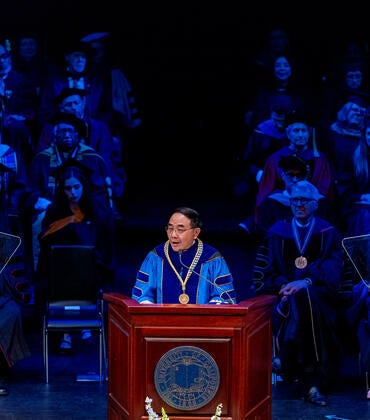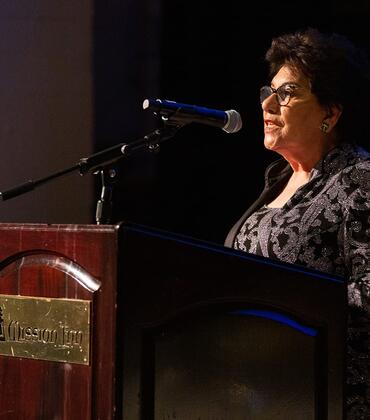
UCR’s Department of Music has invited four indigenous Mexican philharmonic ensembles to convene outside of the Performing Arts Building on Sat., Jan. 27 from noon to 3 p.m. for the inaugural Oaxacan Philharmonic Bands Audition.
More than 140 multigenerational philharmonic musicians will gather for an afternoon of traditional Mexican music at the University of California, Riverside.
UCR’s Department of Music has invited four indigenous Mexican philharmonic ensembles to convene outside of the Performing Arts Building on Sat., Jan. 27 from noon to 3 p.m. for the inaugural Oaxacan Philharmonic Bands Audition. The event marks the first time these four ensembles will play together on any university campus in California. The concert will be a friendly musical battle among musicians whose familial roots originate in the southwestern Mexican state of Oaxaca.
The Inland Empire audience will be serenaded with a unique repertoire of songs that will be disclosed on the day of the performance. The concert is free and open to the public. Seating will be provided, but attendees are encouraged to bring their own lawn chairs. Free parking will be available in Lot 1.
“This is about demystifying the norms and breaking stereotypes about indigenous communities,” said Xóchitl Chávez, assistant professor of music and lead organizer of the event. “It’s about taking a traditional European style of music that has become ‘Mexicanized’ and elevating it.”
This musical showcase focuses on the interpretative quality of each band’s respective repertoire, Chávez said.
Chávez also intends to showcase UCR’s Department of Music so that community members may learn about undergraduate, master’s, and doctorate degrees available at UCR.
Connecting the community to these philharmonic bands also creates an opportunity for Latino youth to see successful musicians in neighborhoods where children no longer have access to music classes at school.
For many youth, being identified as “indigenous” can be a source of embarrassment. Chávez, however, pointed to the accomplishments of the Zapotec immigrants who formed these bands in the late 1980s and early 1990s. The musicians — identified as Zapotec due to the name of their native language — form part of one of the most organized and resilient communities to settle in the United States in recent time, said Chávez, who has devoted more than a decade to researching these philharmonic bands and completed a Ph.D. in cultural anthropology at UC Santa Cruz.
Chávez also produced a short documentary film on the Zapotec bands featuring young and female musicians. The short is titled “Booming Bandas of Los Angeles: Oaxacan Women and Youth as New Cultural Bearers of Philharmonic Brass Bands.”
Performing music in Oaxaca was traditionally an occupation restricted to men, but immigration to the United States changed the dynamics. Band leaders recruited their wives and eventually their own children. Meanwhile, older band members who learned to play music by ear now play alongside teens learning the craft by reading sheet music.
Among these young people is Jessica Hernández, a 2010 UCR alumna. Henández graduated with a bachelor’s degree in music and now works side-by-side directing with her father, Moisés Hernández, director of Banda Nueva Dinastía de Zoochila. This integration of generations has resulted in the preservation of culture, tradition, and language of these Oaxacan communities in Southern California, Chávez said.
During the Jan. 27 event, audience members will see — and hear — the musical talents of the following four bands:
- Banda Nueva Dinastía de Zoochila, directed by Jessica Hernández and Moisés Hernández
- Banda Yatzachi el Bajo – Los Angeles, directed by Ali Guzmán
- Banda Filarmónica Maqueos Music, directed by Estanislao Maqueos
- Banda Filarmónica Santa María Xochixtepec, directed by Ernesto Cruz Valente
The afternoon will conclude with a grand finale as the four ensembles play the song “Dios Nunca Muere” in unison, which is the de facto anthem of Oaxaca, composed by Macedonio Alcalá in 1868.
If You Go:
Oaxacan Philharmonic Bands Audition
When: Saturday, Jan. 27
Where: UC Riverside’s Performing Arts building — outdoor auditorium
Time: Noon to 3 p.m.; concert will begin at noon
Additional details: Bring your lawn chairs; free parking in Lot 1; Oaxacan Philharmonic Bands Audition



